|
|
|
Sort Order |
|
|
|
Items / Page
|
|
|
|
|
|
|
| Srl | Item |
| 1 |
ID:
137114
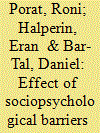

|
|
|
|
|
| Summary/Abstract |
During protracted intractable conflicts, society members develop a sociopsychological infrastructure that leads to selective and biased information processing, obstructing the penetration of new information that may facilitate peacemaking. To validate a process model that depicts the functioning of these barriers, we conducted a study among 207 Israeli Jews, focusing on the effects of long-term barriers on information processing. After measuring these barriers, we introduced an invented peace proposal and gave participants the option of processing additional information concerning its implications using the Decision Board Platform. Aided by this platform, we conducted an in-depth analysis of information acquisition strategies and found that four general worldviews (i.e., traditional and universal values, incremental theory, and authoritarianism) were associated with the ethos of conflict, which in turn was associated with the general amount and type of information processed. The theoretical and applied implications are discussed.
|
|
|
|
|
|
|
|
|
|
|
|
|
|
|
|
| 2 |
ID:
150992
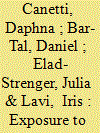

|
|
|
|
|
| Summary/Abstract |
Does ongoing exposure to political violence prompt subject groups to support or oppose compromise in situations of intractable conflict? If so, what is the mechanism underlying these processes? Political scholarship neither offers conclusive arguments nor sufficiently addresses individual-level forms of exposure to violence in the context of political conflict, particularly the factors mediating political outcomes. We address this by looking at the impact of exposure to political violence, psychological distress, perceived threat, and ethos of conflict on support for political compromise. A mediated model is hypothesized whereby exposure to political violence provokes support for the ethos of conflict and hinders support for compromise through perceived psychological distress and perceived national threat. We examined representative samples of two parties to the same conflict: Israelis (N = 781) and Palestinians from Gaza, East Jerusalem, and the West Bank (N = 1,196). The study’s main conclusion is that ethos of conflict serves as a mediating variable in the relationship between exposure to violence and attitudes toward peaceful settlement of the conflict.
|
|
|
|
|
|
|
|
|
|
|
|
|
|
|
|
| 3 |
ID:
188834


|
|
|
|
|
| Summary/Abstract |
The present article considers the viability of a confederation between Israel and the Palestinian Authority with Jordan as a realistic solution to the ongoing conflict between Israeli Jews and Palestinians. It presents the background and the course of the Israeli–Palestinian conflict, with a description of the present situation in order to understand the possible solutions to the conflict. I also explore several ideas of how to peacefully resolve the conflict that is entertained at present. A special focus is on the proposal of Alon Ben-Meir (2022) about building a confederation delineated in the Spring issue of this journal. Thus, in the second part, the concept of confederation is described and three barriers to its implementation are elaborated. The first discusses the approach of presenting a rational plan, whereas in reality, participants in conflict develop a sociopsychological repertoire that serves often as a barrier to the solution. The second comment elaborates on the complex nature of reconciliation that cannot be required as a necessary precondition for the solution of the conflict. The third comment pertains to the asymmetry of the parties in the Israeli–Palestinian conflict that is a serious barrier to the implementation of the phases of the proposed confederation. Finally, I describe briefly the different proposals that are on the table at present and evaluate their feasibility.
|
|
|
|
|
|
|
|
|
|
|
|
|
|
|
|
| 4 |
ID:
175770


|
|
|
|
|
| Summary/Abstract |
The Israeli-Palestinian conflict and the occupation continue, with no solution in sight. Furthermore, tremendous forces are working to strengthen the occupation, and there are even those who profit from it.
|
|
|
|
|
|
|
|
|
|
|
|
|
|
|
|
| 5 |
ID:
092053
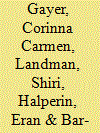

|
|
|
|
|
| Publication |
2009.
|
| Summary/Abstract |
One of the most important psychological barriers to conflict resolution is the rigid structure of the sociopsychological repertoire that evolves in societies immersed in intractable conflict. This article examines ways to overcome the rigidity of this repertoire in the context of the Israeli-Palestinian conflict. Specifically, in line with the prospect theory, the authors assumed that elicitation of beliefs about losses stemming from the continuing conflict may bring about a process of "unfreezing." To test this assumption, an exploratory study with a national sample of the Israeli-Jewish population and two subsequent experimental studies were conducted. The results demonstrated that exposure to information about losses inherent in continuing the conflict induces higher willingness to acquire new information about possible solutions to the conflict, higher willingness to reevaluate current positions about it, and more support for compromises than the exposure to neutral information or to information about possible gains derived from the peace agreement.
|
|
|
|
|
|
|
|
|
|
|
|
|
|
|
|
| 6 |
ID:
154293
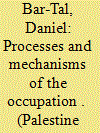

|
|
|
|
|
| Summary/Abstract |
The occupation has created processes that have dramatically changed the Israeli state and society, and only with the return of political power to the majority will it be possible to set in motion a process that will lead to the end of the occupation.
|
|
|
|
|
|
|
|
|
|
|
|
|
|
|
|
| 7 |
ID:
107657
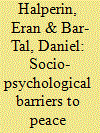

|
|
|
|
|
| Publication |
2011.
|
| Summary/Abstract |
Socio-psychological barriers play a major role in the continuation of intractable conflicts. They are responsible for the socio-psychological closure that resists and prevents the entertainment of alternative information that could potentially facilitate the acceptance of ideas advancing peacemaking processes. In an attempt to validate a process model that depicts the functioning of the socio-psychological barriers to conflict resolution, an empirical study was conducted among a nationwide representative sample of Jews in Israel, within the context of the Middle Eastern conflict. The reported study utilized a large scale survey, based on a nationwide representative sample of Israeli Jews who were asked to respond to a questionnaire which included the model's selected variables. As hypothesized, the results showed a path leading from general worldviews (e.g. General values, Right Wing Authoritarianism, Implicit theories about groups) to openness to new information and readiness to compromise through the mediation of the conflict-related societal beliefs (e.g. victimhood, delegitimization). These results indicate that closure to new information that may shed new light on both the rival and the conflict emerges as a crucial factor in the maintenance of society members' non-compromising views. The theoretical as well as the applied implications of the findings are discussed.
|
|
|
|
|
|
|
|
|
|
|
|
|
|
|
|
| 8 |
ID:
093602


|
|
|
|
|
| Publication |
2010.
|
| Summary/Abstract |
Although prolonged occupation of a nation is no longer a common phenomenon, where it does exist, it bears harsh implications for all parties involved. This article examines the socio-psychological implications of occupation on the occupying society, using the case of the Israeli occupation of the Palestinian territories of the West Bank and Gaza Strip since 1967 as an example. The article first delineates the concept of occupation from a socio-psychological perspective, which supplements the legal-formal aspect. The authors then propose a conceptual framework that analyzes the psychology of the occupying society. Within this framework, they describe the psychological challenges that the occupation may pose to the members of the occupying society. Next, they introduce psychological mechanisms that members of an occupying society may use in order to avoid facing these challenges. Finally, they offer a number of ideas regarding the relationship between these mechanisms and the process of ending the occupation.
|
|
|
|
|
|
|
|
|
|
|
|
|
|
|
|
| 9 |
ID:
075290


|
|
|
|
|
|
|
|